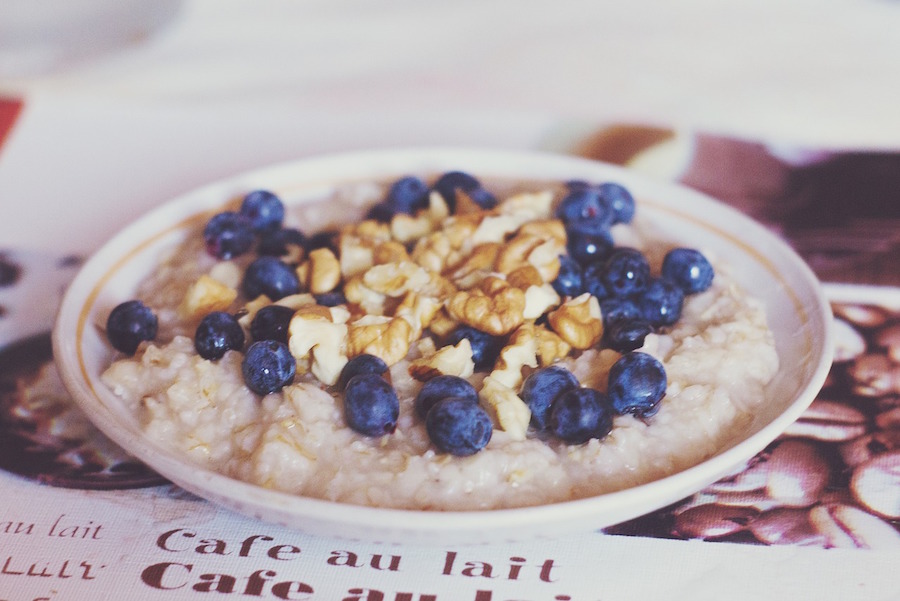Are you an oatmeal lover? What’s your favorite oatmeal combo? Mine is oats, currants, cinnamon, and Celtic Sea Salt cooked together and topped in the bowl with butter – Kerry Gold, Organic Valley, or Amish. Then I stir in pecan pieces and sunflower seeds, and drizzle with maple syrup or sprinkle with coconut sugar. Yummmm!
But as tasty as oatmeal can be, they leave some of us feeling bloated, gassy, and irritable. This is not a good way to start the day! But if you follow these simple guidelines, you can not only ensure that you will digest those delicious oats, they will also taste even better.
The secret to good-for-you oatmeal
The secret? Soak your oatmeal overnight in water with raw apple cider vinegar, Kefir, yogurt, or lemon juice. For each 3/4 cup of dry oats, stir into the soaking water just 1 teaspoon of vinegar or lemon juice, or 1 tablespoon yogurt or Kefir. Mix in the dry oats and soak overnight.
When you are ready to start cooking, drain the soaking water and rinse the oatmeal (rinsing will get rid of any acid-y taste). If you decide you don’t want oatmeal for breakfast the morning after soaking, just rinse and refrigerate until you do want it.
Make all grains healthier with this method
I encourage everyone to soak grains, such as rice and quinoa, using the same method. Why? All grains and legumes contain phytic acid, an organic acid which blocks mineral absorption in the intestines. Phytic acid can also block digestive enzymes – ouch.
Phytic acid can be neutralized in as little as seven hours of soaking. Soaking activates something called phytase, which is a helpful enzyme. Phytase helps begin the digestion of proteins in grains, such as the ever scary protein, gluten. By properly digesting this and other proteins, you might just prevent the development of allergies to them.
By the way, all traditional cultures soaked, sprouted, fermented, or ‘soured’ their grain foods. Sourdough, for example, contains lactic acid which naturally breaks down phytic acid, but making it is a lengthy process and it’s not simple to industrialize. The introduction of yeast streamlined commercial bread-making, but ironically, yeast has surely contributed to our greater intolerance of grains. Low carb, no-grain diets are popular and helpful for so many people because the grains available to us are not prepared correctly.
So soak your grains overnight in water with an acidic medium such as lemon juice or vinegar. Drain and rinse the next morning and refrigerate until you are ready to cook them.
More tips on preparing grains
Did you know that all rice, whether organic or conventional, brown or white, contains some arsenic? The rice plant naturally takes up arsenic from the soil. To compound this, conventional fertilizers contain arsenic, which then dissolves into the soil and is taken up, too. When glyphosate (Roundup) is added to the growing mix, the levels of toxins are off the charts.
Research shows that a simple rinsing of grains before cooking will reduce the levels of toxins, but I believe that soaking before rinsing is even better. In fact, I like to “swirl – wash – rub” my soaked grains before draining and rinsing, to rid them of even more of the nasty things.
A few final thoughts on grains
If you are allowed to eat bread, be sure to choose sprouted, such as Berlin Bakery Sprouted Spelt breads or Ezekiel bread, or sourdough breads such as Berlin Bakery Sourdough Spelt bread or Gluten-Free Teff Sourdough muffins.
What else? Gelatin improves the digestibility of every food including grains. You can use meat bone broth to cook your rice or quinoa, or for flavorless gelatin factors, sprinkle Great Lakes gelatin over the cool water before cooking.

